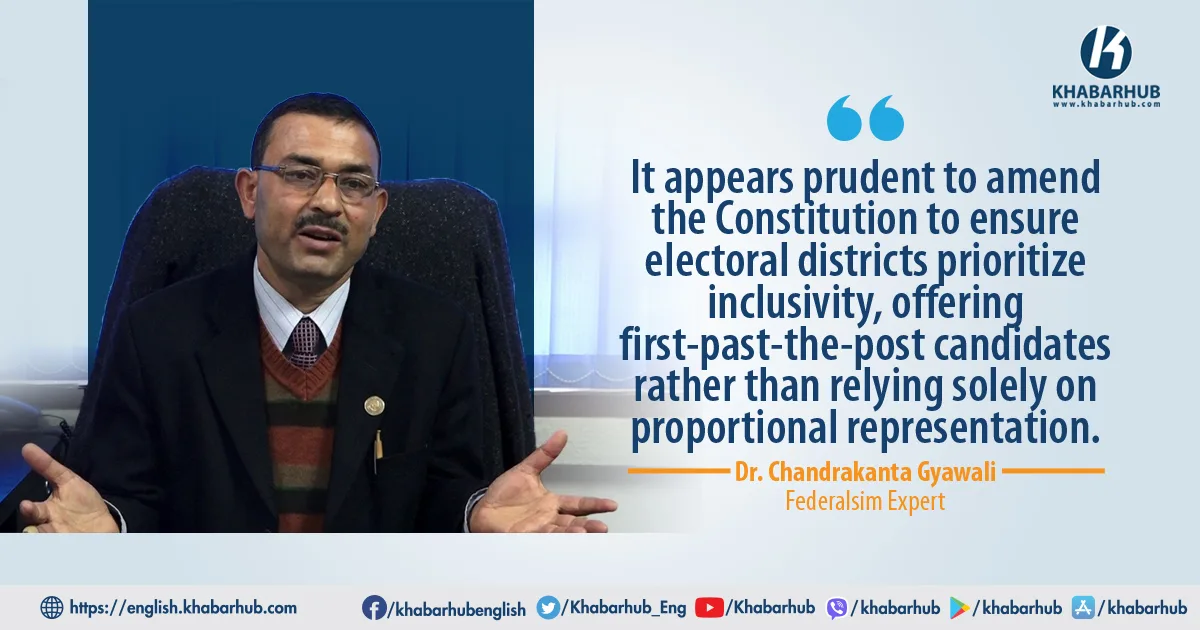KATHMANDU: Previously it was stated that the country would experience significant progress following the implementation of federalism.
Leaders also anticipated substantial development. However, the current challenge lies in the country’s inability to sustain provincial structures independently.
The federal government is increasingly required to support and maintain state structures.
As political changes from the center begin to impact the provinces, there is widespread debate regarding their effectiveness.
In this context, Khabarhub held a conversation with federalism expert Dr. Chandrakanta Gyawali. Excerpts:
Political leaders have started acknowledging that the trust that should have been instilled in the people during the 8/9 years of constitution implementation has only deepened disappointment. What could be the reason?
Federalism was introduced, inclusivity was emphasized. The Constitution was promulgated by the Constituent Assembly based on two principles.
However, even with federalism in place, whether it’s full or semi-federalism, the Constitution still falls short of envisioning complete federalism.
In terms of the executive, it appears that both the federal government and local provincial governments share powers.
In the parliament, all assemblies are actively legislating. However, in the judiciary, it still operates like a unitary system.
There are central commissions in the federal structure, but they seem disconnected from provincial and local levels.
Consequently, our current federalism resembles more of a semi-federal system rather than a fully functional federal structure.
This is evident in its authority and jurisdiction, which fails to embody the principles of federalism as envisioned.
Government agencies have also centralized, showcasing sporadic instances of federalism in the executive and legislature, while remaining unitary in essence.
This has hindered constitutionalism and restrained limited government initiatives.
To address these issues, comprehensive structural reforms are essential, encompassing functional, regional, and quantitative improvements.
Establishing the first Constitutional Reform Suggestion Commission and implementing its recommendations would mark a crucial step towards completing these reforms.
Ultimately, this could have enhanced federal inclusivity, ensuring it delivers more than disappointment.
Local elections, after a 20-year hiatus, revealed extensive neglect at the grassroots level, with roads, lights, water, and other basic amenities in disrepair.
Infrastructure improvements have since been made, with gravel roads being paved and essential services like electricity, water, and internet reaching more areas.
Economically, federalism has empowered lower-level governments to address these longstanding issues.
At the provincial level, efforts have been made to enact 30/35 rights-based laws mandated by the provincial constitution in its inaugural year.
However, the judiciary remains centralized, hampering access to justice at the grassroots level.
Cases from remote regions, such as Jumla, are still referred to the Supreme Court, exacerbating the cost and complexity of justice.
The need for judicial restructuring is evident, alongside reforms of government agencies and commissions.
This includes establishing the Election Commission and Public Service Commission as independent bodies under provincial jurisdiction.
Despite these challenges, industrial expansion remains limited, hindering economic growth and exacerbating youth migration.
Addressing these issues, alongside university reforms, could spur employment opportunities and halt the outflow of youth from rural areas.
During all these 8/9 years, were the political parties sincere in implementing the constitution, or did they treat it as a mere political ploy?
The political culture and system within the parties have yet to stabilize. Following the federal parliament elections, parliamentarians took their oaths and elected the parliamentary party leader.
From the outset, political traditions did not adhere to parliamentary norms; instead of convening parliament, parties rushed to the president to form the government without completing the required 165-member House of Representatives election.
The National Assembly elections should have followed.
After the state and local elections, the House of Representatives elections were concluded.
However, instead of the required 110 elections, 165 were conducted, leading to a majority for my party to form the government without holding a parliamentary session.
Concerns were raised against such actions, and eventually, after a delay of two months, the election for 110 members was conducted, and the government was formed.
Unfortunately, shortly after this, parliament was dissolved, driven by party interests and rivalries.
As soon as political parties ascend to power at the federal level, they extend their influence to the provincial level.
Due to simultaneous elections, rather than allowing provinces to independently elect their governments, parties seek to align provincial governments with their federal power structure.
This undermines the desired political culture where provincial governments should function autonomously without interference.
For instance, in Koshi Province, the frequent change of governments contradicts Article 168 of the Constitution.
This instability is often influenced by the ruling party at the federal level, causing repeated interventions that disrupt provincial governance and result in frequent changes of government.
Even at the federal level, within less than two years, three votes of confidence have been sought.
This trend of seeking votes of confidence across party lines reflects a lack of party discipline and stability.
Instead of fostering a stable and robust government, this tradition has resulted in 5 to 6 prime ministers being appointed rather than having one serve a full term.
This practice undermines the constitutional principles and the intended political culture of maintaining strong leadership.
To rectify this, there is a need to institutionalize these practices into law, ensuring that constitutional principles are strictly followed.
This is how people feel, which is why they have continuously advocated for change, stability, and good governance. It’s natural for citizens to feel disappointed, isn’t it?
None of this would have occurred if political parties and governments had prioritized stability and adhered to constitutional principles.
Initially, politics guided us towards constitutionalism when the constitution was being drafted.
Today, however, constitutionalists should be guiding politics, but this hasn’t materialized.
As a result, a sustainable political culture has not emerged, and provincial governments are often influenced by directives from the federal government.
Political instability persists as long as parties prioritize their own interests over national welfare.
The decentralized nature of governance, stemming from past unitary practices, means that governments at all levels operate independently.
There should be minimal interference in each other’s affairs. Instead, interdependence should be fostered, and federalism should be embraced with responsibility and accountability to realize its benefits fully.
It’s unrealistic to expect one election to solve everything; each new generation inherits the political culture shaped by its predecessors.
With the Constitution now in place as the supreme law, there is no need for unnecessary concern when new generations enter politics.
How are new generations being shaped in today’s political landscape?
During elections, it is crucial for the electorate to carefully consider the maturity, competence, and transparency of candidates.
They should not blindly follow the directives of political parties and their supporters. Informed voting based on these considerations will lead to better outcomes.
If major parties fail to perform effectively, new generations will emerge with fresh perspectives and approaches.
Leadership emerges naturally through experience and proactive engagement. Looking at the current scenario, capable and ethical leaders will inevitably arise to serve the nation’s interests.
Even prominent political parties are no longer assured of sustained influence.
The public’s disillusionment arises when leaders prioritize personal gain over public welfare, distinguishing those who genuinely serve from those who do not.
Political parties have initiated a debate questioning whether the current election system and form of government should remain unchanged. Is the issue rooted in the electoral system?
The Election Commission also conducted a study on inclusion within the initial election system. Back in 2012, I was part of an expert group where five individuals analyzed 22 electoral systems worldwide.
Based on these findings, they proposed an electoral system spanning from local levels to the federal government in the Constituent Assembly.
However, despite our recommendations, the proposed system did not pass during the constitution-making process, leading to the adoption of a mixed election system.
It appears prudent to amend the constitution to ensure electoral districts prioritize inclusivity, offering first-past-the-post candidates rather than relying solely on proportional representation.
Implementing such a system could foster joint governance at state and federal levels, prevent frequent government dissolution for coalition formations, and curb the buying and selling of parliamentary seats. Hence, there is a pressing need to reform the electoral system.
Establishing a high-level commission for constitutional amendment is imperative.
Without these changes, the current instability in governments and parliaments will persist.
Therefore, it is crucial for the government to thoroughly review the electoral system before the next elections.
For example, we proposed 22 electoral systems to the commission, and now it is essential to thoroughly examine three of these systems to determine the most suitable one.
It is vital to conduct elections that truly represent all citizens and ensure credible leadership without wasting votes.
Therefore, initiating a high-level commission under government auspices appears necessary to amend the electoral system effectively.









Comment